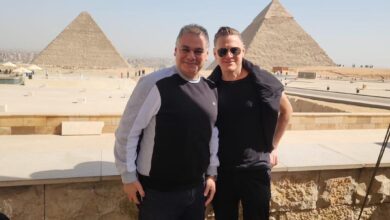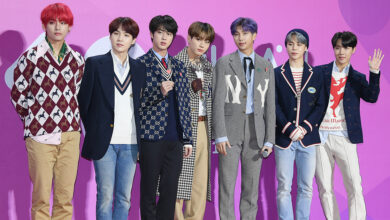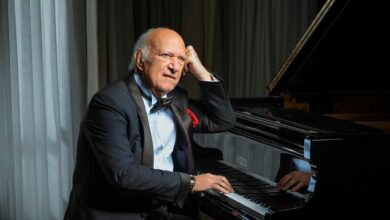Ever since its introduction to Egypt, heavy metal music and its fans have been perceived by many as being westernized, disturbed, dark or evil. “Metalheads” or “headbangers,” locally known as shabab el-metal (metal youth), or mateela (roughly: metalists), have often been associated with alcohol and drug use, addiction, extramarital sex, orgies, sexually transmitted diseases, aggressiveness, Zionism, Satanism, animal sacrifices, and other vices.
In January 1997 these claims culminated in the arrests of nearly 100 metal fans. While such wholesale crackdowns may have decreased, and while metal is said to be on the rebound, its fans still report incidents of detention and harassment at the hands of authorities.
The Facebook group Against Heavy Metal Persecution In The Arab World was recently established as an awareness-raising forum for the regional metal scene. The group’s mission statement says:
Our purpose is to raise awareness concerning the persecution and arrest of heavy metal fans and musicians in the Middle East. By bringing enough support to this cause, we hope to bring change that will allow us to have the freedom to play and listen to the music we love without fear of harassment, intimidation and arrest. We love our countries and our families. We mean no harm to anyone. Our only crime is playing and listening to what many other people reject. We are law-abiding, good citizens who only ask to be treated fairly and equally, instead of being questioned and harassed.
Al-Masry Al-Youm could not reach the Interior Ministry’s media spokesperson for questions regarding the emergency law (in effect since 1981) to find out whether or not this law allows arrests based on a person’s attire or musical preferences.
Metal fan “Bulldozer” told Al-Masry Al-Youm that he was arrested with eight other black-clad metal fans in October 2005. Having attended a metal concert earlier that night “we were hanging around on the street outside the venue. We weren’t causing any problems, nevertheless a police patrol pickup truck stopped in front of us, and rounded us up.”
“Bulldozer” added “they arrested us and took us to Qasr el-Aini Police Station where we were questioned for two hours. The interrogating officers kept asking us: why are you dressed like this? Do you worship the devil? Do you sacrifice cats? Along with other absurd questions.” He concluded that the Egyptian media was responsible for distorting the image of metal fans.
Media stereotypes have arguably misled many Egyptians into making this association. Movies including “el-Agenda el-Hamra” (2000) and “el-Qatl el-Laziz” (1997), while not focusing directly on metal fans, portrayed them as dangerous, promiscuous motorcyclists who abuse drugs and share needles. Sensationalist articles, caricatures and talk shows may have bolstered such stereotypes.
In February 2010, Journalist Wael el-Ebrashy’s talk show “Al Haqiqa” (The Truth) hosted Tuhami Muntasir, former advisor to Egypt’s mufti. Muntasir argued that Egypt’s metal scene was “a Zionist-funded activity, with funding possibly coming from Cyprus or Israel.” He added the “Protocols of the Elders of Zion serve as the governing constitution of this conspiracy to control the world.” Similar allegations against Egyptian metal fans were recently made on other talk shows this year. Such claims have vehemently been denied by metal fans.
Metal fan Omar “Caesar” Mostafa argues that the Egyptian state, having crushed an armed Islamist insurgency in the 1990s, “sought to show the populace that they lived under a righteous, moral, and faithful authority; it used metal fans as scapegoats to prove this point.”
Caesar added that there are some bad apples amongst Egyptian metalheads. “Some metal youth do drugs; but this is common amongst many musicians and fans of different musical genres–not just metal.” He went on to say that there are some black metal bands abroad that incorporate Satanic lyrics in their songs, but “very few youth in Egypt, less than a handful, describe themselves as Satanic. Typically it’s only a brief phase that some disturbed youth go through as a means of rebellion, or to gain some attention. But they aren’t genuine Satanists, and they quickly grow out of this phase.”
The heavy metal sound originated in the UK during the late 1960s with the band Black Sabbath. It is a hard and loud sound generally characterized by distorted electric guitars (which are often down-tuned and plugged into effects) backed up by crashing drums. Keyboardists and vocalists-who typically use singing techniques such as screams, shouts, and grunts-are commonplace in metal bands.
Metal quickly spread across Europe, the USA, and then around much of the world, spawning countless local acts. Numerous genres of metal emerged, and are still emerging. Metal made a big breakthrough in the Arab World between the late 1980s and early 90s. Hundreds of metal bands can be found from Morocco to the UAE. Some metal musicians from this region have incorporated Arabic musical scales and instrumentations into their sounds. Other metal fans have adopted conservative elements into their metal attires–including the hijab (headscarf); while males may grow religiously inspired beards, or prayer marks on the foreheads.
In Egypt, and the rest of the Arab World, metal bands are an exclusively underground phenomenon. As of yet, this music has not made it into the mainstream music scene of any Arab country. Local metal bands perform covers or originals, primarily sung in English. There are far fewer Arabic language metal songs.
Drummer Nayyer Osama, from the progressive metal band Anarchy said “playing metal is a productive release of energy. It occupies youths’ time and may very well keep them from using drugs, harassing girls on the streets, or other sorts of mischief.” Osama added “some metal youth may indeed use drugs, and some may chose to partake in extramarital relationships–but these are personal decisions. It’s not metal that makes them do so.” He said he hadn’t encountered, or even heard of any Satanic Egyptian headbangers.
Peter Ayman, lead guitarist of the soft metal band Diminished, said “metal is the most stereotyped form of music in this country.” He added “elsewhere in the world there are some Satanic metal bands, but there are also religious metal bands out there.”
[Egyptian Metal Bands]
Ethereal Credence (Black Metal)
www.myspace.com/etherealcredence
SCARAB (Death Metal)
www.scarabegypt.com/
www.myspace.com/scarabegypt
Crescent (Blackened Death Metal)
www.myspace.com/crescentband
ODIOUS (Melodic Oriental Black Metal)
www.myspace.com/odiousegypt
Grave Solace (Ambient Atmospheric Funeral Doom Metal)
www.gravesolace.tk
www.myspace.com/gravesolace
Konzaross (Psychedelic Melodic Dark Music)
www.konzaross.tk
www.myspace.com/konzaross
Dark Philosophy (Black Metal)
www.darkphilosophy.tk
www.myspace.com/darkphilosophyband
Beyond East (Extreme Oriental Metal)
www.myspace.com/beyondeast
MystiriuM (Death Metal/Black Metal)
www.myspace.com/mystiriumband




